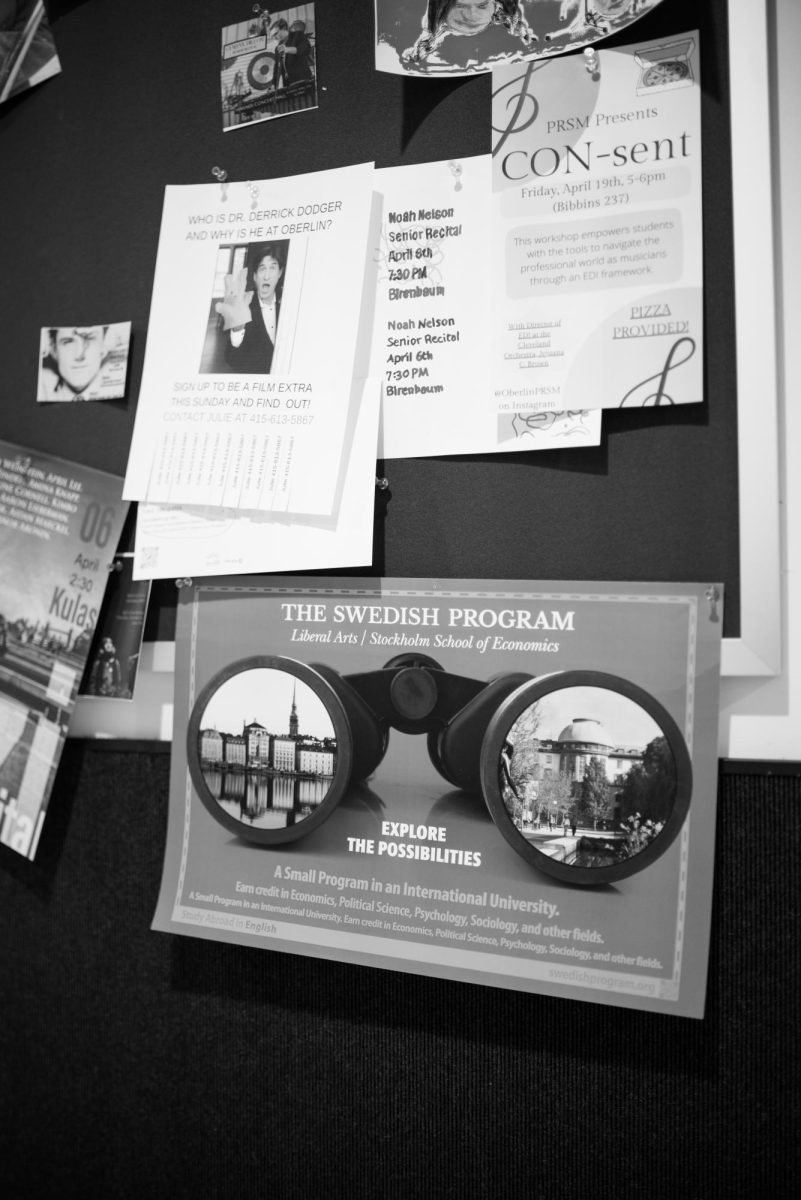Ira Glass Waxes Poetic About Storytelling
October 7, 2011
The stage setup was unremarkable: a couple of standing microphones, a bottle of water and a mug sitting on a small table, a plain metal music stand. There was nothing, really, to catch the eye. And when Ira Glass, executive producer and host of National Public Radio’s This American Life, walked casually up the stairs and into view of the crowd packing Finney Chapel last Saturday, there was no fanfare to announce his arrival. But the moment Glass came onstage, the scene was transformed into something much more intriguing.
In 2001, Time magazine named Glass the best radio host in the country, and more recently, he was the 2009 recipient of the Edward R. Murrow award, “the highest individual honor in public broadcasting.” It’s no wonder, then, that a flurry of foot stamping and raucous cheers swept through Finney as Glass beamed out into the audience, the lights glinting off his iconic glasses.
Accompanied only by an iPad — and therefore by every idea, conceived or realized, that he and his team had ever had for TAL — Glass essentially performed a live episode onstage, cuing music behind his speech and playing clips from shows and interviews. The result was very similar to the episodes aired on over 500 radio stations across the country every week. The decision to recreate the feel of a show seemed very much intentional. It was evident that he was performing — he cued sound clips with exaggerated arm movements; he strolled grandly around the stage, testing his cordless mic; he nodded and gazed evenly around the packed hall while he listened to his clips. Every word and movement was deliberate.
But Glass was still himself. He laughed at his own jokes — even giggled a few times — and peppered his speech with “like”s. When friend and singer Lucy Wainwright Roche, OC ’03, came onstage for a duet of OK Go’s “Needing/Getting,” Glass warned the audience that he was no Garrison Keillor when it came to singing. His singing voice was fairly terrible, but no one would say that he wasn’t enjoying himself.
Though Glass seemed to be enjoying himself onstage, his ease did not carry over into being taken for a “major rock star,” as President Krislov introduced him. When a student expressed how nervous she was to be talking to him during the Q&A, Glass responded, “I’m very normal, I promise.”
And Glass is normal in the best sense of the word: He is relatable, funny, humble and casually familiar (a fact that is unsurprising to anyone who has listened his show). He is also incredibly talented. But no one wants to have his ass needlessly kissed, and anyone who tried to pucker up was more or less instantly shot down. When one student asked him to “Give us some tips for excising all the pompous bullshit from our own lives,” he asked her for some examples. “Like people,” she said. “Talking to people.” Glass stared at her for a moment, then said, “You can ditch your friends, you know.”
If some mistook Glass’s demeanor for harsh, they didn’t realize that this was his way of treating everyone — first-year or college president, interviewee or radio legend Artie Lange — with the same amount of respect, humor and amusement. He didn’t stoop to the level of insipid questions or odd requests (“A hug? Really? Isn’t that kind of weird?”) just because we were students and he felt the need to be pandering or polite.
This attitude, according to Glass, extends to the student interns at TAL, who are treated like producers from day one. The process to snag one of those coveted spots is competitive; in Finney alone, there were very few students who wouldn’t give one extremity or other to have the chance to work for TAL.
This sort of passion for public broadcasting was not as common when Glass got into the business back in 1978. As he told the story, he fairly stumbled into a job with the National Public Radio promotional department the summer after his freshman year of college. “Like most normal people,” he said — there’s that word again! — “I had no interest in radio.” It was a summer job, it was fun, and the higher-ups let him stick around. Glass stuck around for the next three decades.
After working his way through virtually every job offered at the NPR headquarters in Washington, D.C., Glass began This American Life in 1995, broadcasting out of Chicago (though the production has since moved to New York City). In the 16 years since its inception, TAL has garnered a handful of the most prestigious awards available in both journalism in general and public broadcasting specifically.
Despite the accolades, Glass said that it’s “pretentious, annoying and overblown to say we’re changing lives,” and assures us that no show of TAL’s has ever changed one tiny bit of social injustice. In fact, he went on, it rarely even affects the people featured in the show in any kind of tangible way. So why are we all so nuts over it?
Whereas most news organizations make the world seem “stupider, smaller and less interesting,” in Glass’s words, TAL focuses on the surprise, amusement, humor and pleasure in the world, rather than going for the “fake gravitas that the George Stephanopouli and most other news organizations adopt in the hopes of being taken seriously,” Glass pointed out. TAL tells personal stories — a young girl learning to ride her bike, a man driving across the country and learning Spanish from CDs, a high school class trip to the Grand Canyon — and that is exactly where most journalism doesn’t usually go.
While studying semiotics at Brown University, Glass came upon Roland Barthes’s book S/Z, a structural analysis of the short story “Sarrasine.” Inspired, he set out to find just what it was in a story that gave a listener pleasure. What Glass came up with is striking in its obviousness: action. Intrigue. Pulling the listener forward.
“A story is about motion,” he said. “We stick around to see what’s going to happen.”
To illustrate this point, Glass played a clip from an episode of TAL from 2001 called “Cringe.” The scene was set as Glass’s voice described a man in an office who formed a joking, playful relationship with the office manager’s 9-year-old daughter who would sometimes accompany her mother into work. One day, this man, Joe, came out of the bathroom with his glasses in his shirt pocket — “We know that this is an important detail,” Glass pointed out — and saw a small figure coming down the hallway toward him.
“And then I get down and start to crab walk toward her,” described Joe. “So I go down on my haunches and put my hands up as if they’re claws and waddle toward her —” and Glass cut the clip. “At this point,” he said, “no one is turning off the radio.” The crowd roared. They knew that he was right.
To get across that universal something to which the listener is relating, Glass continuously repeated his formula of “action, action, action, thought.” “We start out every show like that,” he said. With 1.7 million weekly listeners, and an additional half a million downloads of the podcast (making it the most popular in the country), he must be onto something.
It was at moments like this when the audience realized just how much Glass was teaching. He wasn’t pedantic or patronizing; he just had over 30 years worth of experience in public broadcasting to back up his claim that he could teach us “everything you need to know to make [a story] fascinating-er.”
With a crowd made up of mostly college-age students on the brink of entering the work world, no one was about to turn down his advice, which was, “It’s OK to be bad for a while,” a piece of wisdom that came from personal experience. Glass was no stranger to the rough learning curve of one’s 20s. He played clips from a story he did in the seventh year of his career for a series on international food issues. This particular topic? “The international debate on whether sorghum and meat production are causing corn to decline in Latin America.”
“Oh, yeah,” said Glass wryly. “That debate.”
The main problem, aside from the point of the story being somewhat incomprehensible, was that Glass was trying to sound like a radio personality instead of just talking like himself. This realization is what led Glass — and many other well-known NPR reporters and producers before him — to adopt the casual, conversational style of writing and speaking on the air that TAL is known for.
“You don’t have to be serious,” Glass pointed out. “It’s much more important to be excited and to amuse yourself.”
The only way out of the bad period, Glass instructed, is “to burn your way out.” This means producing a lot of work and getting more experienced people to critique it. Glass used to pay producers at NPR $50 each to look at his pieces, which turned out to be “a lot less expensive than grad school.” Glass also suggested imitating the style of admirable people, which he did when he was teaching himself how to write a compelling story. “I wouldn’t tell my editor, but I would be like, ‘OK, I’m going to write this entire story asAlex Chadwick.’”
Glass ended his talk with a story about the most famous of storytellers: Scheherazade, the newlywed Arabian queen who kept herself from death at the hands of her mad husband by telling him a story each night. Using characters to invoke empathy in the king, after several years and thousands of stories, he wasn’t crazy anymore.
“She saved her life for 1,001 nights only with the tool of narrative suspense,” said Glass. “And sex. I can’t help you with the sex part, but I’m telling you — narrative suspense can save your life!”
Despite the humorous interjection, Glass continued to discuss the power of the narrative. What it’s about, explained Glass, is “a door to a deep part of us where reason and logic and argument don’t necessarily hold sway.” These days, we are more bombarded with stories — every television commercial, YouTube video or tweet — than any human being who has ever walked the planet. Yet it’s still so rare to hear a story and feel that elusive moment of empathy. It only comes when the characters “seem exactly human scale, seem exactly like [real people].”
In radio, there are no images to enhance that moment of connection. “You just turn on the tape recorder, and the fact that you just hear their voice, and a voice can have so much feeling, there’s this instant where you can think, ‘That’s what it would be like to be that person.’”
Making that connection, said Glass, looking around the packed Finney, at the faces gazing raptly back at him, “is what we’re trying to do every day in public radio. [It’s] what we’re trying to do every day in our show.” He gave a barely perceptible shrug. “And… I don’t know if it’s important that people make stories like that, but it’s important to me. I feel better when I encounter a story like that. I feel more sane.”
Having already spent a full 90 minutes onstage, with another hour of questions yet to go, Glass brought his speech to a close with characteristic eloquence and simplicity. “So,” he laughed. “That’s my talk.”


















